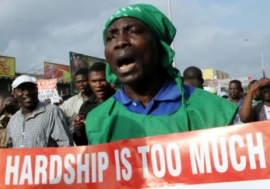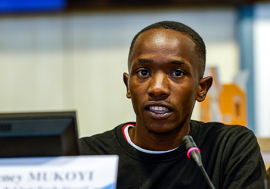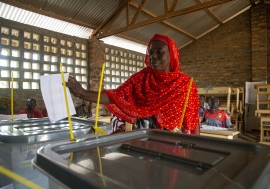Building peace from the ground up
Building peace from the ground up
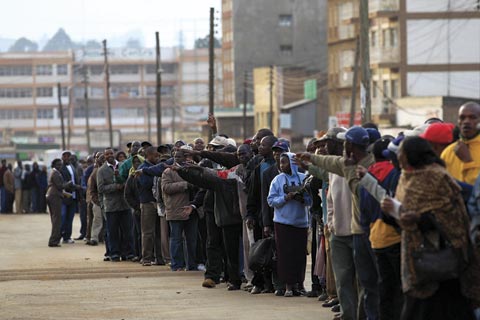 Voters queue up for a referendum on a new constitution in Kenya in 2010: Activists mobilized in large numbers to help get out the vote.
Voters queue up for a referendum on a new constitution in Kenya in 2010: Activists mobilized in large numbers to help get out the vote.With peace agreements ending wars across Africa, thousands of local communities have in recent years embarked on the long road of rebuilding and revival. The course is daunting: not only to generate productive livelihoods in difficult economic times, but also to avoid new eruptions of violence.
African civil organizations are especially well placed for such efforts, notes Chukwuemeka Eze, programme director of the West Africa Network for Peacebuilding (WANEP), a regional civil society group headquartered in Accra, Ghana. That is because they often have much closer links to local communities than do either national governments or international agencies. “The best and most sustainable peacebuilding process should be locally generated, and externally supported,” he told Africa Renewal. While the United Nations and other external institutions certainly can be helpful, Mr. Eze adds, programmes to consolidate peace must be “driven by African civil society organizations,” in close collaboration with African governments and regional organizations.
Whether they came from Kenya, Côte d’Ivoire, Guinea-Bissau, Morocco or elsewhere, various civil society activists delivered a similar message at a brain-storming session on “peace, stability and development in Africa” held in Nairobi, Kenya, last December. Although organized by the UN’s Office of the Special Advisor on Africa (OSAA), the meeting did not dwell on official UN peacebuilding activities, but instead highlighted the central role of African actors, whether from civil society, governments, regional organizations or the African Union, the continent’s leading political body. One aim of the get-together, says OSAA, was to “learn from African experiences,” so that the UN and other international agencies can better align their work with African priorities.
Viewed from strife-torn western Côte d’Ivoire, it is clear that external interventions do not always match local needs, notes About Karno Ouattara, a coordinator for the non-governmental Search for Common Ground. When officials from US and other donor agencies come to help vulnerable people, he told Africa Renewal, “They pick solutions that have worked more or less in another place, and try to apply it, not taking into account the reality of this place.”
Identifying problems
While much attention in Côte d’Ivoire has been devoted to resolving the national political conflict, communities have been grappling with various disputes and tensions of their own, Mr. Ouattara points out. Some were worsened by the partisan warfare of the past decade, but have local causes that have not disappeared with the end of the war. There are “all kinds of conflicts,” Mr. Ouattara observes, relating to land, family disputes and the marginalization of youth and women. “Youth and women really have no place to talk.”
He and other trainers for Search for Common Ground typically spend time trying to help community members first identify their problems and then devise consensual solutions. Often they use film, radio skits and participatory theatre performances to train residents in problem-solving techniques. In one village, for example, tensions between rival youth associations impeded economic activity. But after two years of training, the youths established a common farm, planted rubber trees and started a fishpond.
Results may not be apparent within the short times allotted by many externally funded peacebuilding projects. “We come to stay with people for a long time,” Mr. Ouattara emphasizes. “Even if they say there is peace, we continue working with them. Because peace is really a process, and it takes time.”
Many of the “micro-projects” that UN personnel designed for demobilized ex-fighters in Côte d’Ivoire have failed, Mr. Ouattara asserts, because they did not probe deeply enough to identify the former combatants’ varied problems and develop programmes tailored to their specific needs. It would have been more productive, he says, to first listen to them carefully. “Some of them just want to be heard. So let them talk.”
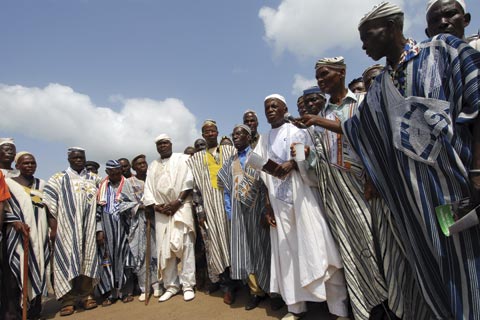 Traditional chiefs meet in a strife-torn community in western Côte d’Ivoire: Civil society activists argue that women and youth also need to be given a voice to help resolve local conflicts.
Traditional chiefs meet in a strife-torn community in western Côte d’Ivoire: Civil society activists argue that women and youth also need to be given a voice to help resolve local conflicts.‘Listen to local voices’
Thomas Jaye, a long-time rights activist from neighbouring Liberia, concurs. If peacebuilding efforts are to be effective, he told Africa Renewal, one must “listen to the local voices. What is it that people want?”
Accurately identifying community problems and needs has been a major preoccupation in post-war Liberia. Beginning in Nimba County in 2008 and then extending to the rest of the country over the next two years, teams of researchers from eight civil society groups canvassed public perceptions of the most contentious problems in more than 270 urban and rural communities.
As part of the UN-supported Platform for Dialogue and Peace in Liberia project, the groups uncovered a wide range of grievances, relating to land and property disputes, corruption and abuses by local authorities, weaknesses in the judicial system, joblessness, gender violence, and competing ethnic, religious and citizenship claims. Conflicts over land were the most common issue. Although the researchers initially set out only to map communities’ perceptions — leaving possible remedies for later — they sometimes were drawn into spontaneous efforts to mediate land disputes.
Women and the ‘hard core’
Gender violence was another prevalent complaint across Liberia, the civil society activists found, along with perceptions that women’s concerns and grievances are simply not being treated seriously. This is despite the fact that Liberia is led by Africa’s first elected female head of state, President Ellen Johnson-Sirleaf. The dialogue project itself has sought to help redress this shortcoming, with women constituting 41 per cent of the nearly 10,000 Liberians involved in the consultations.
The limited progress achieved by women around Africa does not surprise Norah Matovu, a gender and human rights activist from Uganda who also took part in OSAA’s Nairobi meeting. Despite official recognition of the need to involve women in peacebuilding, many African leaders still have an attitude that women do not belong in such “hard-core business,” she told Africa Renewal. These leaders’ outlook is: “The men deal with public issues, the women deal with everything else.”
It is important for civil society to mobilize to help capable women become more involved in political affairs, Ms. Matovu insists, so that they can engage not only with social issues, but also with economic matters, security reform and so on. In countries where women have succeeded in debating such issues, she adds, “more and more you see that attitude is slowly changing.”
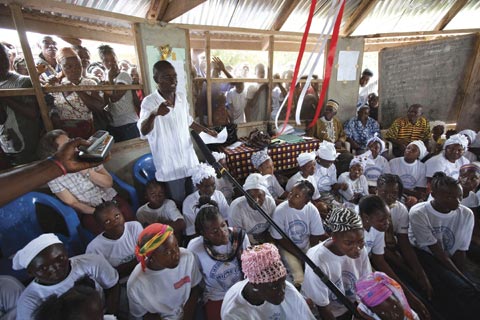 A young man shares his experience during a community gathering on gender at the Women’s Peace Hut in Bong County, Liberia: Across Liberia, women are demanding more attention to their grievances, including widespread sexual violence.
A young man shares his experience during a community gathering on gender at the Women’s Peace Hut in Bong County, Liberia: Across Liberia, women are demanding more attention to their grievances, including widespread sexual violence.Citizen engagement
While working with local communities, activists have also been very involved in the national political arena, among other things by informing citizens of their rights, exposing corruption, supporting democratic reforms, assisting in voter registration and monitoring elections.
In Kenya, the political crisis that erupted in the wake of the disputed election of December 2007 proved to be a catalyst of public engagement. Rachel Gichenga explains that she and a few friends watched with alarm as violence swept the country, taking hundreds of lives and displacing tens of thousands of people. They formed Kuweni Serious, which, along with other groups, used social media and other means to urge young people to vote in the 2010 referendum on a new constitution that expanded democratic rights and strengthened the electoral system.
While civil groups have long been active in Kenya, the electoral crisis opened the way for a “new wave” of organization and mobilization, Ms. Gichenga recalls. “I feel that civil society has kind of come into its own. People have really seen the power of everyone as a change-maker.”
Njoki Ndung’u, who was a member of the committee of experts that drafted the new constitution and now sits on Kenya’s Supreme Court, adds that people must remain alert and politically active. “We have a beautiful constitution” and “the judiciary now has teeth,” she says, but more is needed to avert a relapse into conflict. “Young people have to make demands.”
Checking the military
In some countries, the scope for civil society influence is more limited. This is the case in Guinea-Bissau, where military interventions in political affairs have been frequent, notes Mamadu Quetta, vice-president of the Civil Society Movement for Peace, Democracy and Development. “We find ourselves in a vulnerable situation at all levels,” he says.
But even in countries where the military has withdrawn from direct political life, as in Liberia, civil society needs to remain alert, notes Mr. Jaye, who is currently director of research at the Kofi Annan International Peacekeeping Training Centre in Ghana. In Liberia, he reports, representatives of 11 civil society groups have formed a working group on security sector reform. One of the group’s central activities has been to help train elected legislators to better perform their duties on parliamentary committees responsible for overseeing reforms of the military and police.
Mr. Jaye worries that not enough is being done in Liberia to create jobs for ex-combatants and other young people. Political reconciliation is vital, he says, but so is “closing the inequality gap” in Liberia. “You can preach your reconciliation, but if a person wakes up every morning and doesn’t know what they’re going to have that day, that reconciliation will have a little problem.”
Kwaku Asante-Darko, a senior expert on conflict prevention at the African Union, also believes that economic revival, especially job creation, is especially important for preserving peace in countries emerging from war. “When people are engaged in purposeful life,” he told Africa Renewal, “when people are earning their own living and have hope for the future, then any appeal for violence will not have much attraction.” To create such circumstances, he agrees that the African Union and other official institutions must find ways to better harness civil society abilities and energies.
For early warning, many eyes and ears
To help prevent conflicts from erupting into large-scale violence, political officeholders, police commanders and community leaders all need timely information about developing crises. Traditionally, such information has been gathered and disseminated by state security agencies. But African governments are realizing that their capacities are limited, and that civil society groups, with so many more eyes and ears on the ground, can also help warn of building tensions.
The Economic Community of West African States (ECOWAS) is the first regional grouping of African governments to establish an official early warning mechanism in direct collaboration with a civil society organization, the West Africa Network for Peacebuilding (WANEP). The result is the ECOWAS Warning and Response Network (ECOWARN), headquartered in Abuja, Nigeria, with four additional hubs in Benin, Burkina Faso, Gambia and Liberia. “The system itself is very new, with a lot of room for improvement,” acknowledges Chukwuemeka Eze, a programme director for WANEP.
ECOWARN collects and analyzes data and quickly provides it to the ECOWAS Commission for rapid responses, when necessary. The information comes from government entities, civil society field monitors and open public sources (often Web-based). So far, its timely data has helped ECOWAS mediators and other forces to deploy with varying degrees of success in Liberia, Guinea-Bissau, Togo and Guinea.
WANEP, with a network of civil society affiliates throughout West Africa, brings into the work of ECOWARN its own particular concern for “human security,” on top of the regional governments’ more traditional interest in state security. So in addition to tracking incidents of armed insurgency, drug smuggling and cross-border crime, ECOWARN pays attention to trafficking in people, natural disasters, community conflicts and the plight of refugees and displaced people.
ECOWARN’s situation report for the week of 4–10 June, for instance, tallies 29 separate incidents in eight different countries. Their seriousness is ranked as low, medium or high, depending on the number of people affected and the ability of the government to respond effectively. That week, the incidents included the killing of seven UN peacekeepers in Côte d’Ivoire by suspected Liberian militias, fighting between rival rebel groups in northern Mali and a number of deadly confrontations in Nigeria.
In addition to backing ECOWAS’s wider conflict-prevention activities, WANEP is active through its own national affiliates. On 14 June, Justin Bayor, the national coordinator of WANEP in Ghana, drew attention to a recent alarming increase in violent community disputes in that country, worsened by inflows of small arms and the presence of ex-combatants from elsewhere in the region. “If we do not take care,” he said, “we will very soon have a heavily armed civilian population.” With a general election coming up in December, he added that “we have to work to let it pass peacefully.”
—Ernest Harsch

















